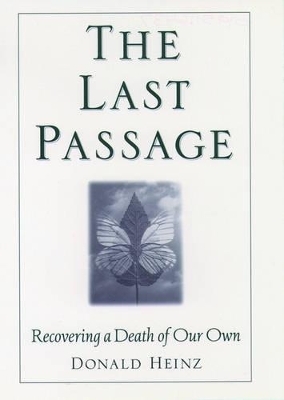
The Last Passage
Recovering a Death of Our Own
Seiten
1999
Oxford University Press Inc (Verlag)
978-0-19-511643-4 (ISBN)
Oxford University Press Inc (Verlag)
978-0-19-511643-4 (ISBN)
Is death merely the cessation of life? Are our final years simply a wearing out of the body? Are hospitals and funeral homes, the bureaucratic machinery of death, capable of handling the profound spiritual dimension of dying?
In The Last Passage, Donald Heinz offers wise answers to these questions in a book that urges us to "recover a death of our own" and to view our final years as a fulfilment, a "last career". Despite the recent spate of books on death and dying, death remains a fact our culture tries desperately to ignore. In other times and in other cultures, preparing for death was seen as an important spiritual task, perhaps the most important task of our lives. Heinz argues that we can reconceive of death, reinvest it with meaning, and save it from becoming a meaningless biological event. Seeking appropriate models for such a reconstruction, Heinz offers a fascinating overview of the many ways death has been envisioned and ritualized throughout human history, from the Tibetan Book of the Dead to 15th century Christian ars moriendi--manuals on the art of dying--and from Jean Paul Sartre to Elizabeth Kubler-Ross. He also surveys the more recent contributions of psychologists, anthropologists, cultural critics, and death awareness advocates, whose efforts have largely failed to integrate death into a larger human story and the larger human community.
Finally, Heinz shows us how we might create rituals through the use of music, visual arts, dance, drama, and language that would enable us to approach death with reverence, as the spiritual consummation of our lives.
In The Last Passage, Donald Heinz offers wise answers to these questions in a book that urges us to "recover a death of our own" and to view our final years as a fulfilment, a "last career". Despite the recent spate of books on death and dying, death remains a fact our culture tries desperately to ignore. In other times and in other cultures, preparing for death was seen as an important spiritual task, perhaps the most important task of our lives. Heinz argues that we can reconceive of death, reinvest it with meaning, and save it from becoming a meaningless biological event. Seeking appropriate models for such a reconstruction, Heinz offers a fascinating overview of the many ways death has been envisioned and ritualized throughout human history, from the Tibetan Book of the Dead to 15th century Christian ars moriendi--manuals on the art of dying--and from Jean Paul Sartre to Elizabeth Kubler-Ross. He also surveys the more recent contributions of psychologists, anthropologists, cultural critics, and death awareness advocates, whose efforts have largely failed to integrate death into a larger human story and the larger human community.
Finally, Heinz shows us how we might create rituals through the use of music, visual arts, dance, drama, and language that would enable us to approach death with reverence, as the spiritual consummation of our lives.
Donald Heinz is Dean, College of Humanities and Fine Arts, California State University, Chico. He lives in Chico, California.
| Erscheint lt. Verlag | 4.2.1999 |
|---|---|
| Verlagsort | New York |
| Sprache | englisch |
| Maße | 160 x 239 mm |
| Gewicht | 585 g |
| Themenwelt | Sachbuch/Ratgeber ► Gesundheit / Leben / Psychologie |
| Geisteswissenschaften ► Psychologie ► Trennung / Trauer | |
| Geisteswissenschaften ► Religion / Theologie | |
| Sozialwissenschaften ► Soziologie ► Spezielle Soziologien | |
| ISBN-10 | 0-19-511643-7 / 0195116437 |
| ISBN-13 | 978-0-19-511643-4 / 9780195116434 |
| Zustand | Neuware |
| Haben Sie eine Frage zum Produkt? |
Mehr entdecken
aus dem Bereich
aus dem Bereich
Psychologische Konzepte im Wandel
Buch | Softcover (2022)
Kohlhammer (Verlag)
CHF 39,95
ein Handbuch
Buch | Softcover (2024)
Hogrefe (Verlag)
CHF 52,50


